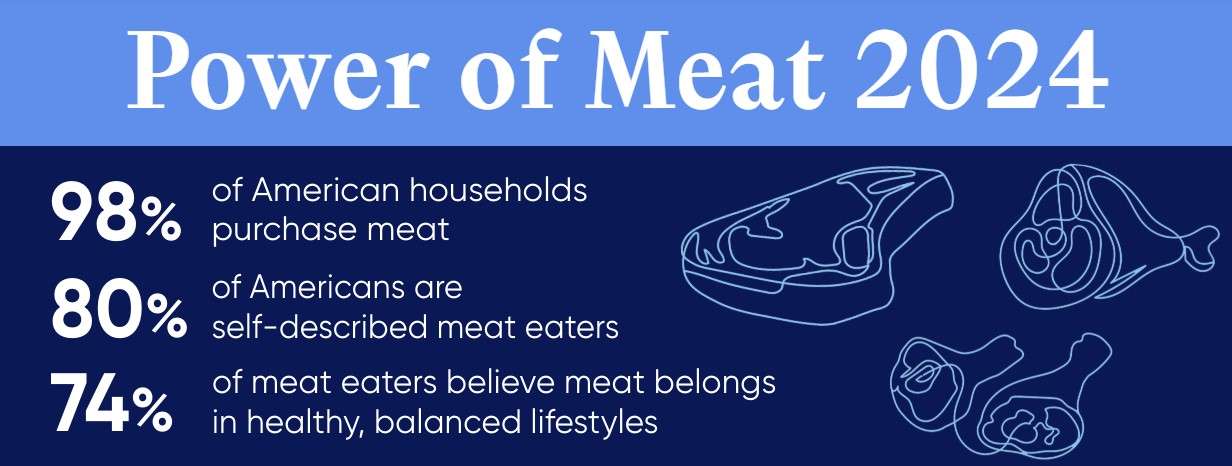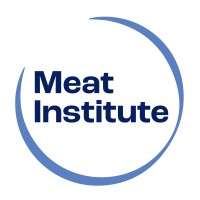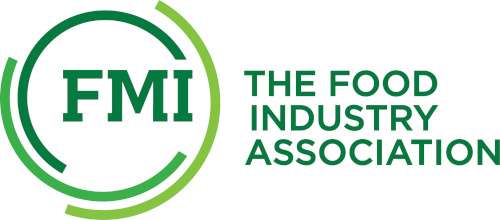The Power of Meat provides an annual update of shopper habits regarding meat and poultry pre-trip, in-store and at home. This research helps the food industry identify how meat purchasing habits are changing to inform business strategy and better meet consumer needs.

The number of Americans who describe themselves as meat eaters (80%) and the number of households that purchase meat (98%) remain steady from 2023, while the number seeking to decrease meat consumption has fallen by 20% since 2020, according to the 19th annual Power of Meat report released by the Meat Institute and FMI — The Food Industry Association.
Overall household penetration averages above 97% for all incomes, ethnicities, household sizes and ages. Generation X (the smallest of the generations) accounts for the greatest proportion of sales (32%), while Boomers buy meat most frequently (53 times per year), and Millennials spend the most money per meat purchase (nearly $17).
As price conscious shoppers look for ways to continue enjoying their favorite proteins, they are cooking more at home and including meat in everything from new recipes found online to their favorite comfort meals and holiday feasts. With shoppers including meat in nearly 87% of home-cooked meals every week and looking to meat to make occasions special, the opportunities to provide great choice, taste, and value continue to grow.
Economic conditions continue to impact Americans’ shopping and meal choices, with 43% of Americans cutting back on restaurant meals. Of meat eaters who are buying restaurant meals less often, 75% try to recreate restaurant-type meals at home.
At the grocery store, 73% of Americans are making one or more changes to meat purchases to save money – with the most common strategy being to adjust the quantity of meat purchased. Among meat purchasers changing quantities to save money, 30% buy smaller packages to save money immediately, and 42% buy larger bulk packs to save money over time. On the other hand, more than nine in 10 shoppers say they would spend extra on occasion, with holidays, special celebrations and entertaining the top reasons.
When shoppers hear ‘protein,’ they think ‘meat,’ and the Meat Institute is actively working to maintain and grow Americans’ confidence about meat’s role in healthy, balanced diets. Our Protein PACT initiative drives progress and provides transparent information about how meat contributes to the health of people, animals, and the planet – which 83% of consumers are looking for when they make meat purchases.
The Power of Meat study was conducted by 210 Analytics on behalf of FMI—The Food Industry Association and the Meat Institute’s Foundation for Meat and Poultry Research and Education.
For summary of key findings, see:
About the Meat Institute and the Foundation for Meat and Poultry Research and Education

The Meat Institute is the United States’ oldest and largest trade association representing packers and processors of beef, pork, lamb, veal, turkey, and processed meat products. The Meat Institute’s non-profit Foundation for Meat and Poultry Research and Education conducts research and education that enable the meat and poultry industry to produce better, safer products and to operate more efficiently, as well as to provide resources to empower consumers with information they need to select and prepare safe and nutritious food for their families. For more information, visit: MeatInstitute.org.
FMI — The Food Industry Association

As the food industry association, FMI works with and on behalf of the entire industry to advance a safer, healthier and more efficient consumer food supply chain. FMI brings together a wide range of members across the value chain — from retailers that sell to consumers, to producers that supply food and other products, as well as the wide variety of companies providing critical services — to amplify the collective work of the industry. For more information, visit: FMI.org.


